Spelling Teaching Resources
Explore spelling games, word lists, activities, worksheets and more to help you teach primary students how to spell a wide variety of words!
Aligned with the Australian English Curriculum, every resource in this expansive collection has been created by a teacher for teachers just like you. Best of all, each resource has undergone our thorough review process to ensure it's ready for your lesson plans and your students.
New to teaching spelling? Or maybe you're just looking for fresh ideas to engage students with the topic? Read on for a primer from our teacher team, including spelling strategies that can help your students become better spellers!
6 Spelling Strategies Every Student Should Learn
Spelling is a fundamental skill that plays a crucial role in literacy development, but in a world of hastily typed (and poorly spelled) text messages and digital tools with built-in spell checker functionality, it can seem like learning how to spell words correctly is falling by the wayside.
So how do you ensure your students aren't just adding to the jumbled up world of words? Arming students with spelling strategies they can use when they encounter new words can help!
The following spelling strategies are great for struggling students and their advanced peers alike as they empower students to face new words without fear — unlike the rote memorisation of words that was once common in spelling instruction.
1. Teach Students About Word Families
By teaching word families, we can help our students recognise and understand how certain letter combinations consistently appear in related words. In turn, this helps them with spelling related words and increasing their vocabulary.
Show your students how words with the same root or base share similar spellings, and have them explore and practice word families by creating word trees or sorting words with common patterns.
2. Work on Breaking Down Syllables
Teaching kids to divide longer words into manageable syllables isn't just a good spelling strategy for upper years students. It can also help them with the pronunciation of new words!
Teach students to identify syllable patterns and break words into syllables. You might want to practise clapping or tapping out syllables, then have them spell each syllable before putting a whole word together.
3. Teach Chunking and Chaining
Breaking spelling words into smaller, manageable chunks or patterns is a helpful strategy for students of various ages — especially those tackling complex words.
To do this, teach your students to identify prefixes such as re- and un-, suffixes such as -ful and -able and root words within longer words. Practice breaking their spelling words into chunks and then combining them accurately.
4. Teach Contextual Spelling
Do your students get their spell words just right in isolation but struggle when writing sentences and paragraphs?
Contextual spelling is a strategy that could help. This comes down to simply having them practise writing their spelling words within sentences, reinforcing word usage and allowing them to apply their spelling know-how in meaningful contexts.
5. Create Spelling Lists With Word Sorting
You may notice that some of the spelling word lists on the Teach Starter site are based on patterns. That's because we recommend categorising words based on specific spelling patterns, helping your students notice similarities and differences.
In addition to using the lists provided, why not work backward? Provide students with a pattern, then provide words that they can spell using that pattern.
6. Use Mnemonics
While English is full of spelling patterns — from words that all follow the long e pattern or all contain the letters igh — it also contains a fair share of words that seem to break all the rules.
Teaching students mnemonics such as 'i before e, except after c and when sounding like a' gives them tips to fall back on when they encounter those rule breakers.
You can also teach difficult words in meaningful sentences or short stories to reinforce their usage, making it easier to recall both meaning and spelling.
Speaking of ...
15 Difficult Words to Spell — And How to Teach These Irregular Words
As we mentioned, the English language is full of tricky irregular words that don't seem to have discernible phonetic patterns and can't simply be broken down via chunking or syllables. That makes them difficult words to spell!
Here's a look at some of the more common difficult words to spell that our teacher team has encountered over the years and some of our best tips on how to help your students remember them!
Here's a list of some commonly difficult words for kids to spell, along with tips on how to effectively teach them:
1. Wednesday
How to Teach It — Break this tricky day of the week word down, sounding it out — 'Wed-nes-day' — to emphasise the correct spelling. Practice saying and writing the word several times to reinforce the spelling pattern.
2. February
How to Teach It — The second month is often spelled without the first r in the right place. To address this, use the syllables strategy mentioned above, breaking down the word into 'Feb-ru-ary' to make it easier to remember.
Emphasise the silent 'r,' and have your students visualise the sequence of syllables.
3. Beautiful
How to Teach It — Break the word into parts — 'beau-ti-ful.' Discuss the rule of 'i before e except after c' and practise spelling similar words that follow this pattern.
4. Definitely
How to Teach It — Break the word into syllables ('def-i-nite-ly') and emphasise the tricky 'i' and 'e' placement. Use repetition and context-rich sentences to reinforce the spelling.
5. Restaurant
How to Teach It — Teach by syllables ('res-tau-rant') and emphasise the challenging 'au' sound. Encourage students to picture the inside of a restaurant to remember the spelling.
6. Accidentally
How to Teach It — Highlight the repeating letters ('c' and 'l') and break the word into manageable parts ('ac-ci-den-tal-ly').
7. Necessary
How to Teach It —The mnemonic phrase 'Never Eat Crispy Crust, Eat Salad Sandwiches And Remain Young' is a teacher team favourite to help kids remember the order of the letters in necessary.
8. Friend
How to Teach It — Friend is misspelled by young students, but emphasising the 'ie' vowel pair can help them get it right. Practise using the vowel pair within other words like 'field,' 'chief,' and 'shield.'
9. Because
How to Teach It — We recommend using the mnemonic strategy for this difficult word, along with practising writing the word in context.
Our favourite mnemonic for because is 'Big Elephants Can Always Understand Small Elephants.'
10. Receive
How to Teach It — Because this breaks the common pairing of 'ie,' receive is often misspelled by students (and adults!).
To teach it, break the word into parts ('re-ceive') and emphasise the 'i' before 'e' rule.
11. Opportunity
How to Teach It — You have an opportunity to help kids remember this one with a breakdown of the syllables 'op-por-tu-ni-ty.' You may also want to review other words with two 'p's, such as appreciate and disappoint.
12. Pronunciation
How to Teach It — Pronouncing new words can be challenging for students, but so is spelling the word pronunciation! To teach this tricky word, use the syllables strategy, emphasising each one — pro-nun-ci-a-tion.
13. Exercise
How to Teach It — You can use visual associations to remember the 'x' and 'c' placement in exercise — like a jumping 'x' doing exercise. You may also want to practice other x words like 'exert' and 'extra.'
14. Separate
How to Teach It — Highlight the tricky 'a' and 'e' placement in separate, and teach the syllables — sep-a-rate.
15. Temperature
How to Teach It — Once again, temperature is a difficult spelling word that can be taught using syllables — tem-per-a-ture.
- Plus Plan
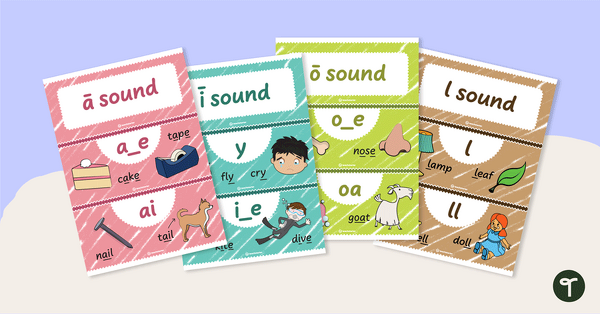
Phonics Sound Wall Display
Build a classroom sound wall to match your phonics programs and literacy progressions with a printable sound wall display.
- Free Plan
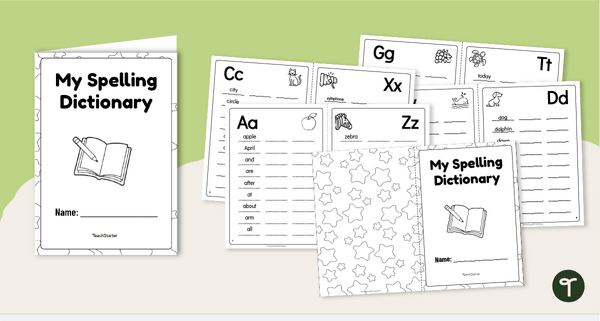
Personal Spelling Dictionary Booklet
Help young learners build their writing and spelling confidence with their very own Personal Spelling Dictionary Booklet!
- Free Plan
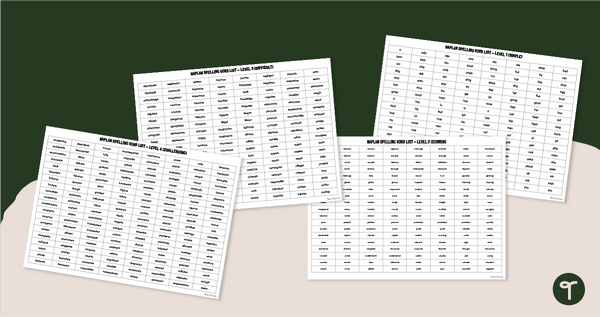
NAPLAN Spelling Reference List
Prepare your students for NAPLAN Language Conventions assessments with a printable NAPLAN Spelling Reference List.
- Plus Plan
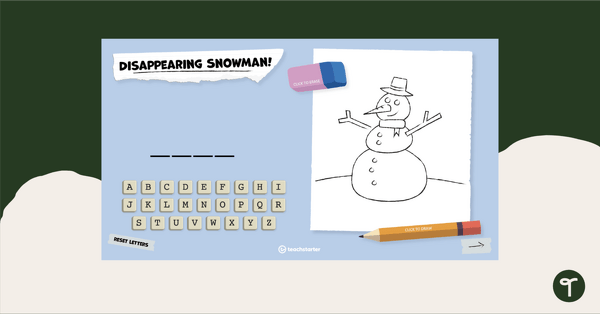
Disappearing Snowman (Hangman Alternative)
An interactive, kid-friendly hangman alternative.
- Plus Plan
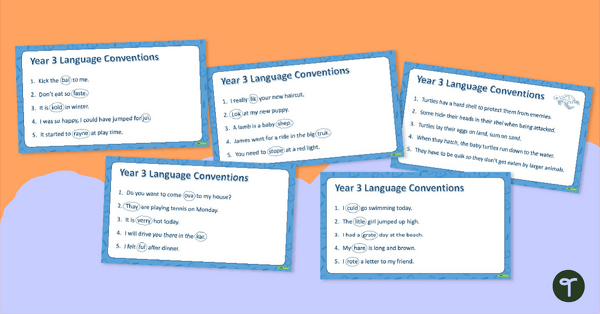
NAPLAN - Language Conventions - Spelling PowerPoint (Year 3)
A 44 slide PowerPoint presentation displaying NAPLAN style spelling questions.
- Plus Plan
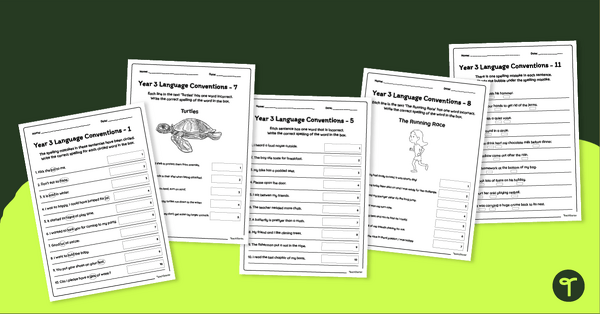
Year 3 NAPLAN Test Practice - Language Conventions - Spelling
Get ready for the test with Year 3 NAPLAN Test Practice Sheets.
- Plus Plan
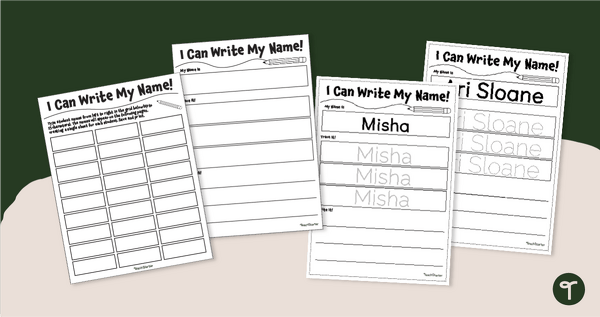
Name Tracing Worksheets - Auto-Fill Handwriting Sheets
Use our Auto-Fill Name Tracing Worksheets PDF to easily create name tracing worksheets.
- Plus Plan
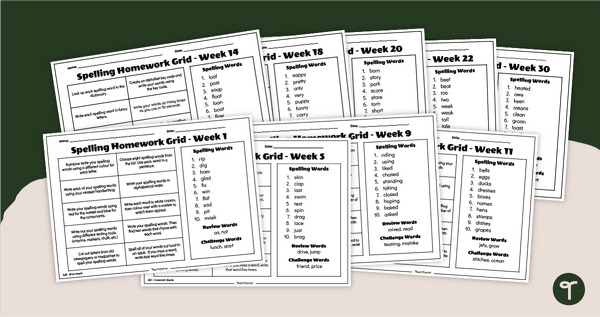
Year 2 Spelling Practice Worksheets - Weekly Homework
Make assigning homework easy all year with Year 2 Spelling Practice Worksheets.
- Plus Plan
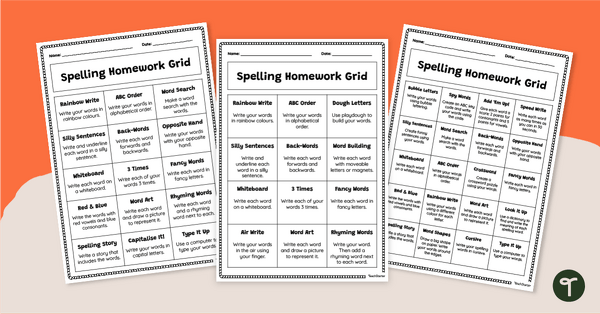
Spelling Homework Grid Pack
Give your students a variety of fun options for spelling homework with Differentiated Spelling Homework Grid Templates.
- Plus Plan
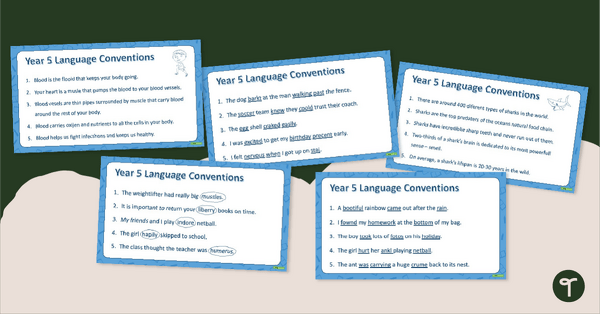
NAPLAN - Language Conventions - Spelling PowerPoint (Year 5)
A 44 slide PowerPoint presentation displaying NAPLAN style spelling questions.
- Free Plan
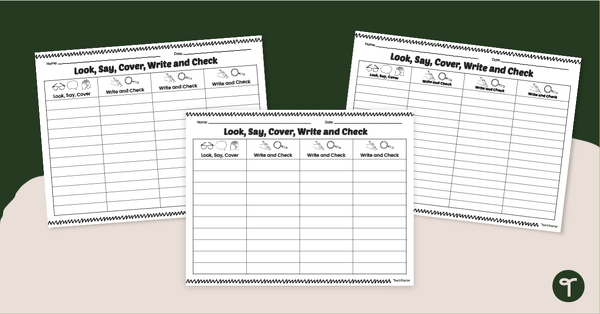
Look, Say, Cover, Write and Check Templates
Use our Look, Say, Cover, Write and Check Templates to encourage students to study and practise their weekly spelling words.
- Plus Plan
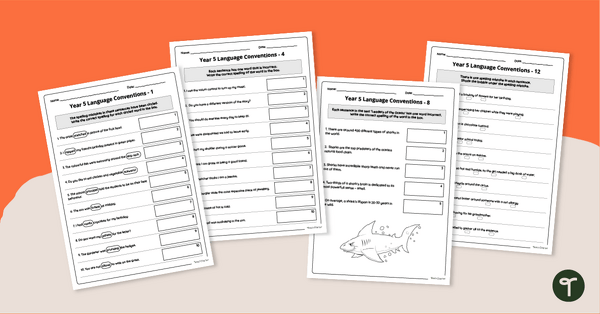
NAPLAN - Language Conventions - Spelling Pack (Year 5)
A set of 12 worksheets with spelling words for NAPLAN Language Conventions Year 5.
- Plus Plan
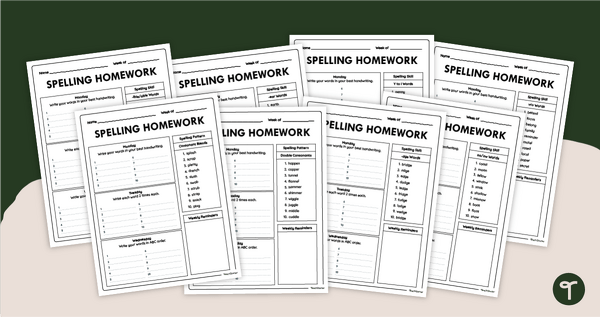
Weekly Spelling Sheets for Year 3
Use our Weekly Spelling Sheets for Year 3 to provide your students with quality spelling homework assignments all year long!
- Plus Plan
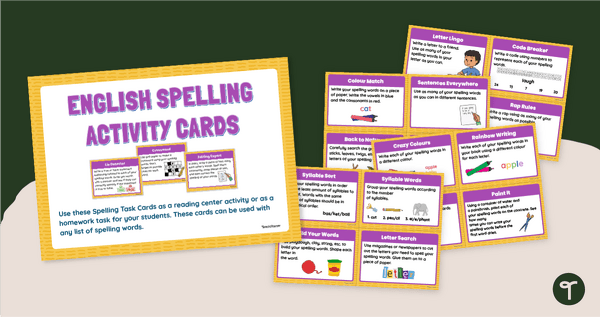
English Spelling Practice Activity Cards
Make English spelling practice more exciting with this set of 24 spelling activity task cards.
- Plus Plan
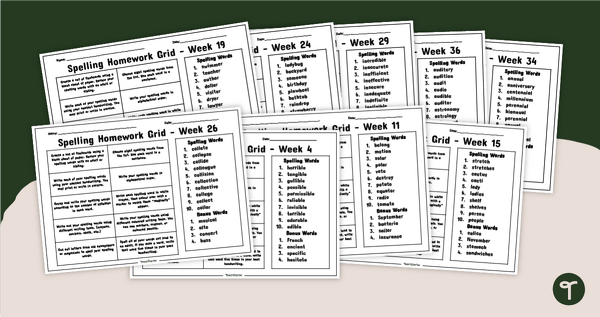
Year 5 Spelling Words Worksheets - Weekly Spelling Homework
Provide your students with engaging spelling homework activities with our no-prep Year 5 Spelling Words Worksheet pack.
- Plus Plan
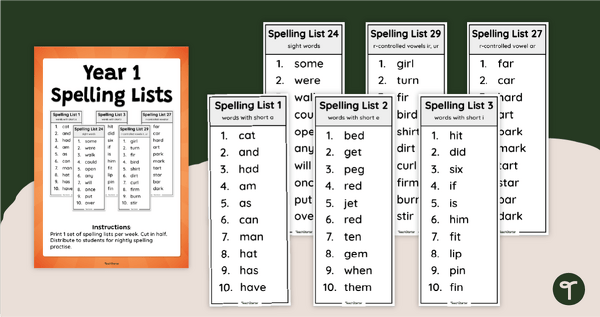
Year 1 Spelling Words - Weekly Lists
Create successful spellers with printable weekly spelling word lists for Year 1.
- Plus Plan
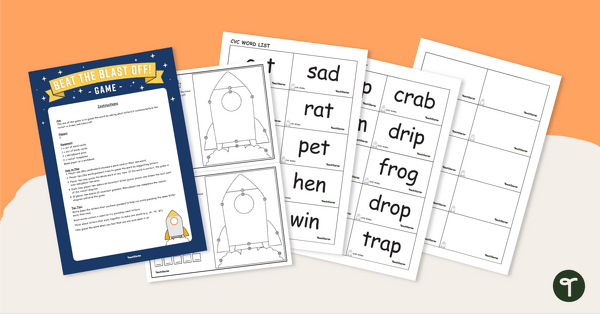
Beat the Blast Off! CVC, CVCC and CCVC Spelling Game
Use this collaborative partner game to familiarise your students with some of the most common CVC, CVCC and CCVC words.
- Plus Plan
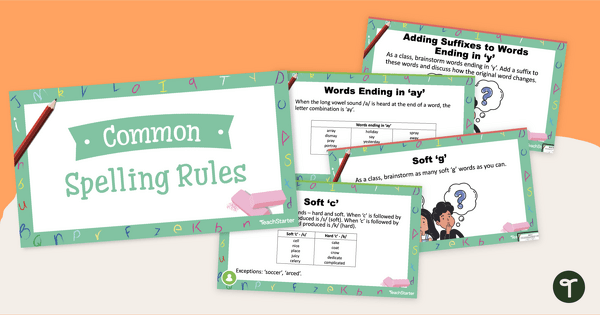
Common Spelling Rules PowerPoint
Boost your students' spelling skills with an instructional slide deck teaching the different spelling rules.
- Plus Plan
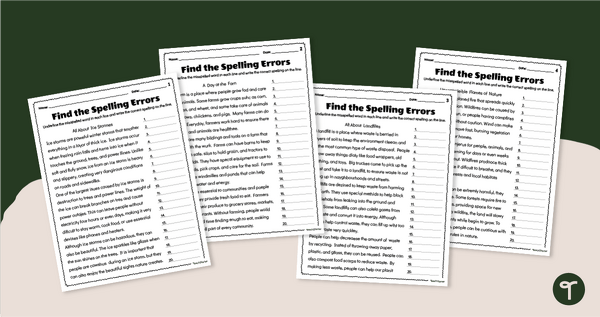
Find the Spelling Errors Worksheets (3-4)
Build spelling and editing skills with printable ‘Find the Spelling Errors’ Worksheets
- Plus Plan
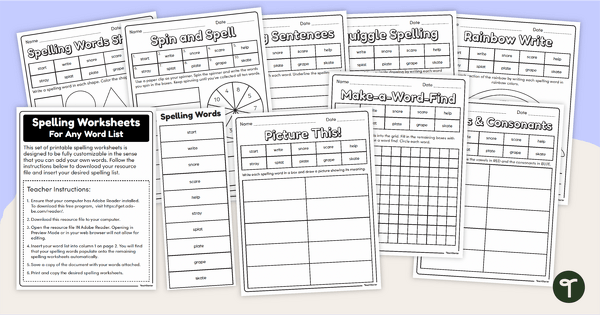
Auto-Fill Customisable Spelling Activity Worksheets
Save time making custom spelling lists and spelling practise worksheets with an editable auto-fill spelling worksheet pack.
- Plus Plan
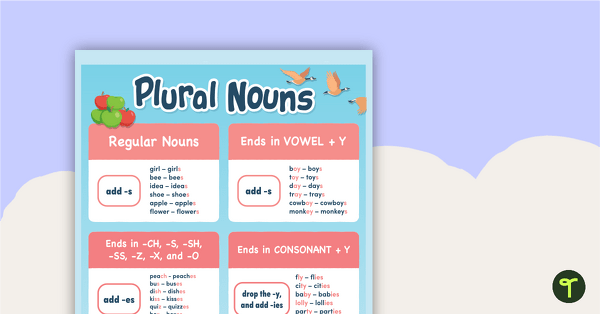
Rules for Plurals - s, es, ies, ves
Display the different rules for plurals with a printable plural noun anchor chart.
- Plus Plan
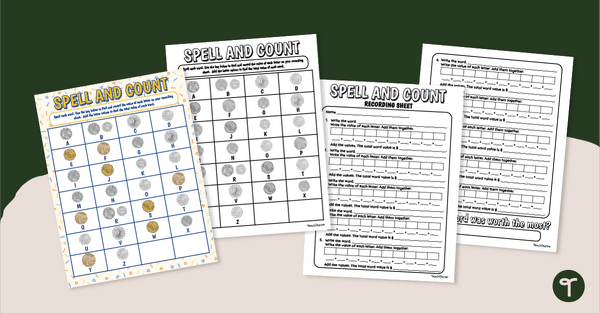
Spell and Count - Money Maths Activity
Develop spelling and money-counting skills simultaneously with a printable spelling and money maths centre activity.
- Plus Plan
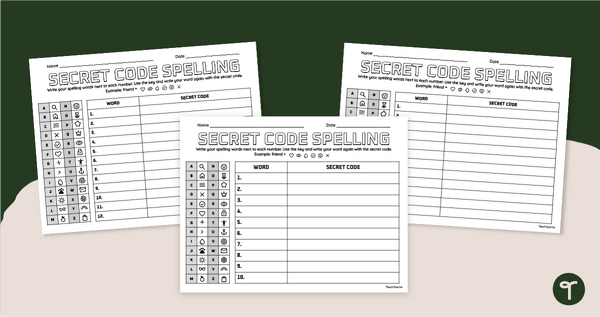
Secret Code Spelling Worksheet Pack
Have more fun with spelling practice by using a Secret Code Spelling Worksheet!
- Plus Plan
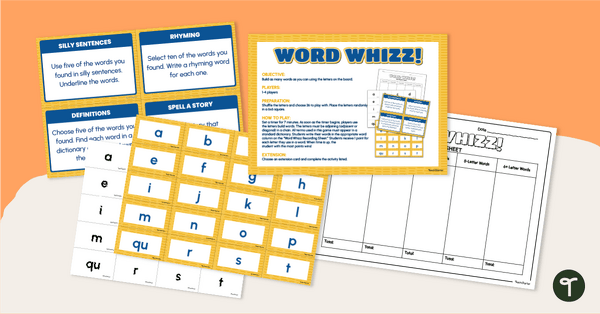
Word Whizz - Spelling Game for Kids
Play ‘Word Whizz’, a fast-paced spelling game for kids that encourages quick thinking and correct spelling.
- Plus Plan
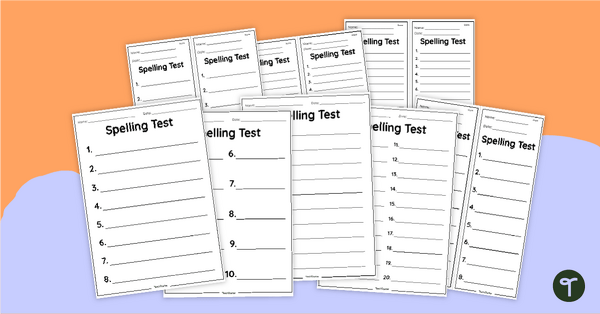
Spelling Test Template Pack
Make those Friday spelling assessments easier with a pack of printable Spelling Test Templates!
- Plus Plan
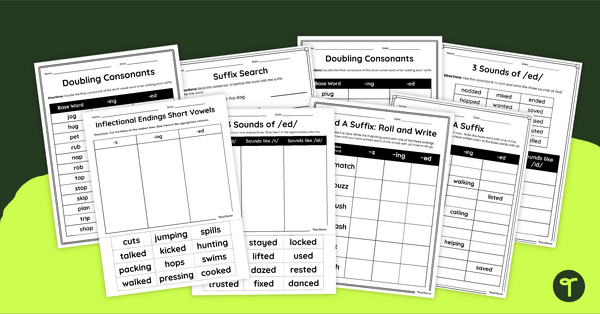
Inflectional Endings - Spelling with Suffixes Worksheets
Spell words with the inflectional endings -ed, -ing, -s, -es and -ies with a pack of printable practise worksheets covering inflected endings.
- Free Plan
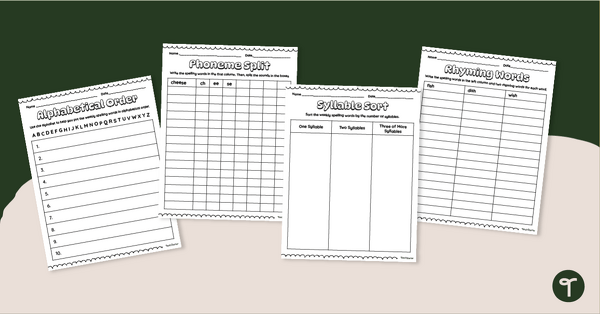
Spelling Worksheets for Any List
Grab these free spelling worksheets for any list and use them to prep your weekly spelling homework with ease!
- Plus Plan
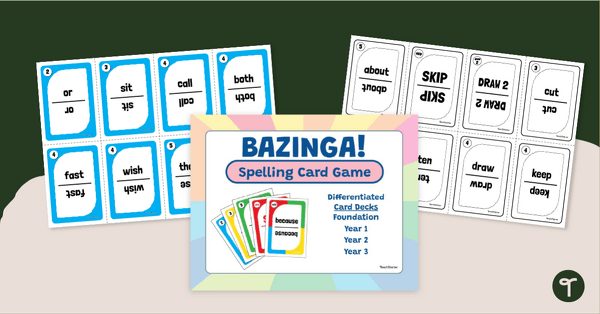
Bazinga! Sight Word Spelling Card Game
Play BAZINGA! a sight word spelling game that is sure to boost your students spelling skills.
- Plus Plan
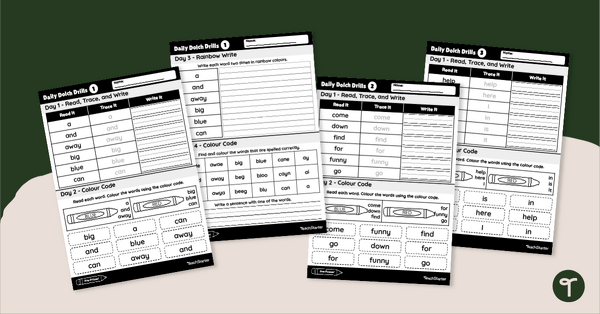
Dolch Pre-Primer Sight Word Sheets - Spelling
Practice Pre-Primer Dolch Sight words with six weeks of daily sight word sheets for Foundation Year students.
- Plus Plan
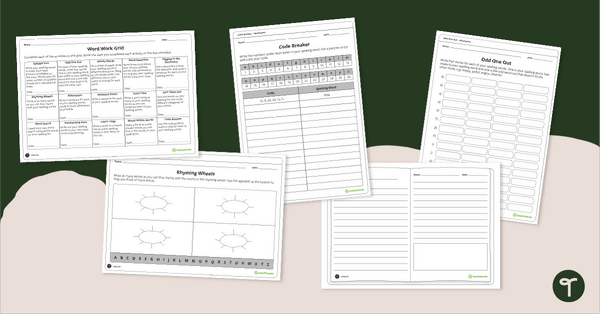
Word Work Grid and Worksheets – Version 1
A grid with spelling activities and corresponding worksheets.
- Plus Plan
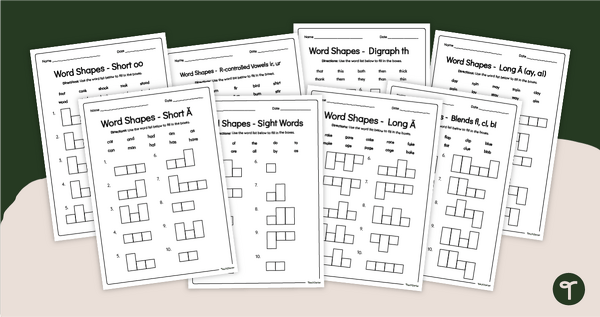
Elkonin Boxes - Word Shapes Worksheets - Year 1
Build early phonics skills with our printable Phonics-Based Elkonin Boxes Word Shapes Worksheets.
- Plus Plan
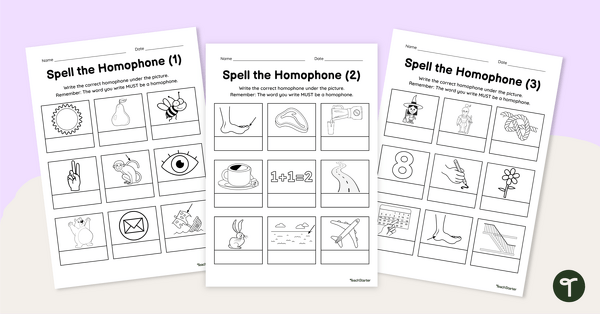
Spell the Homophone Worksheets
Get your students spelling homophones correctly with this set of differentiated worksheets for your vocabulary lessons.